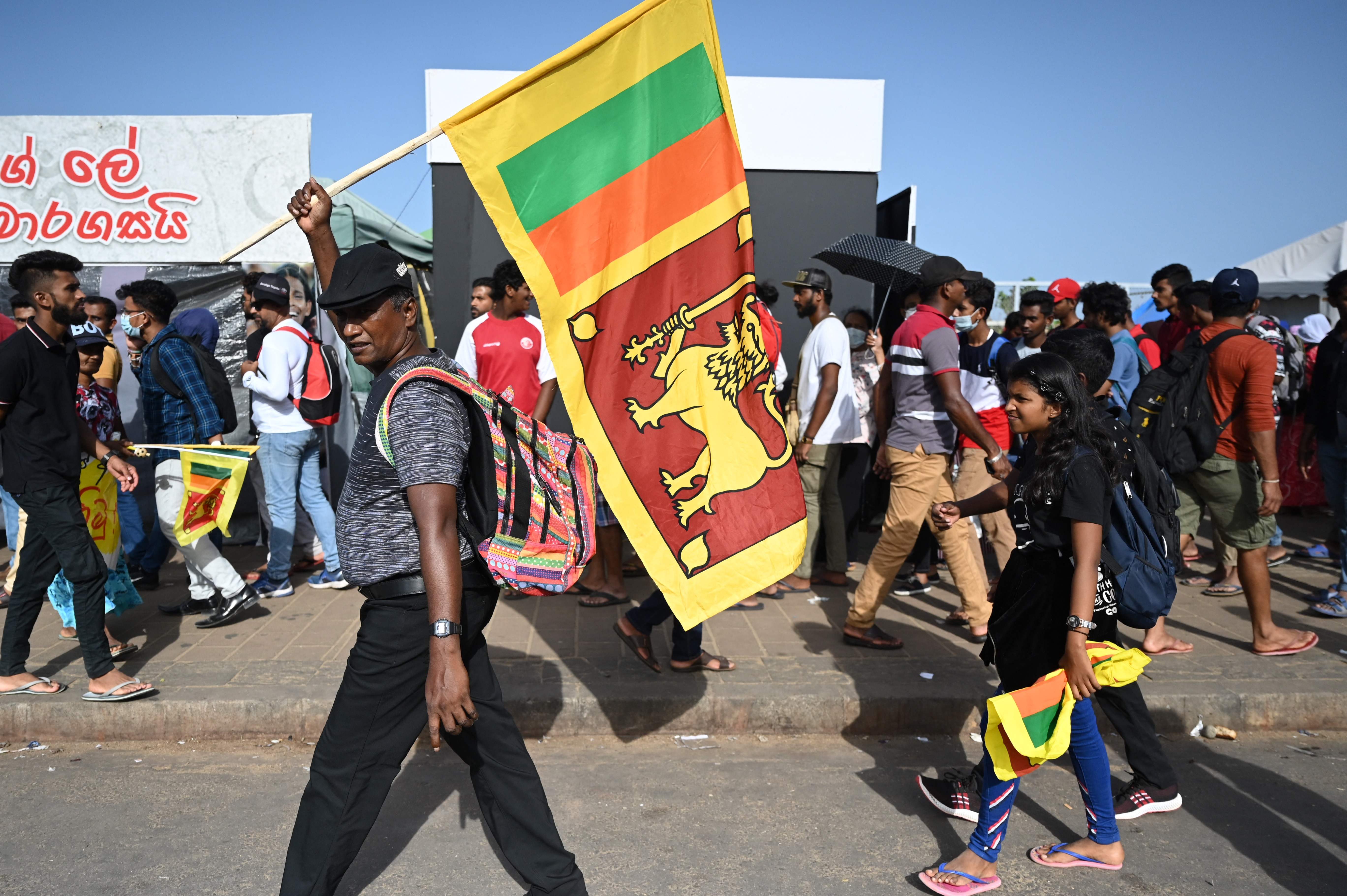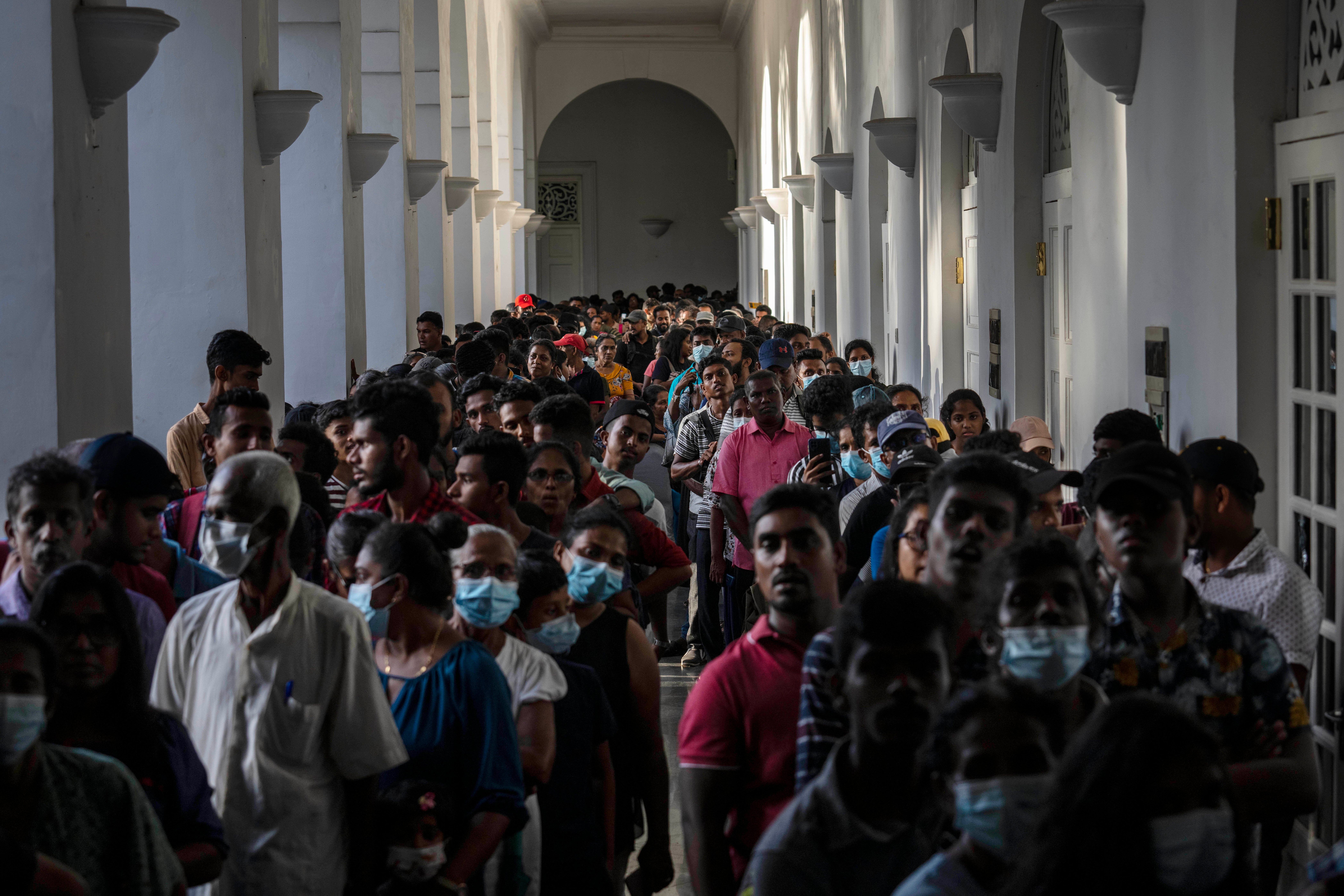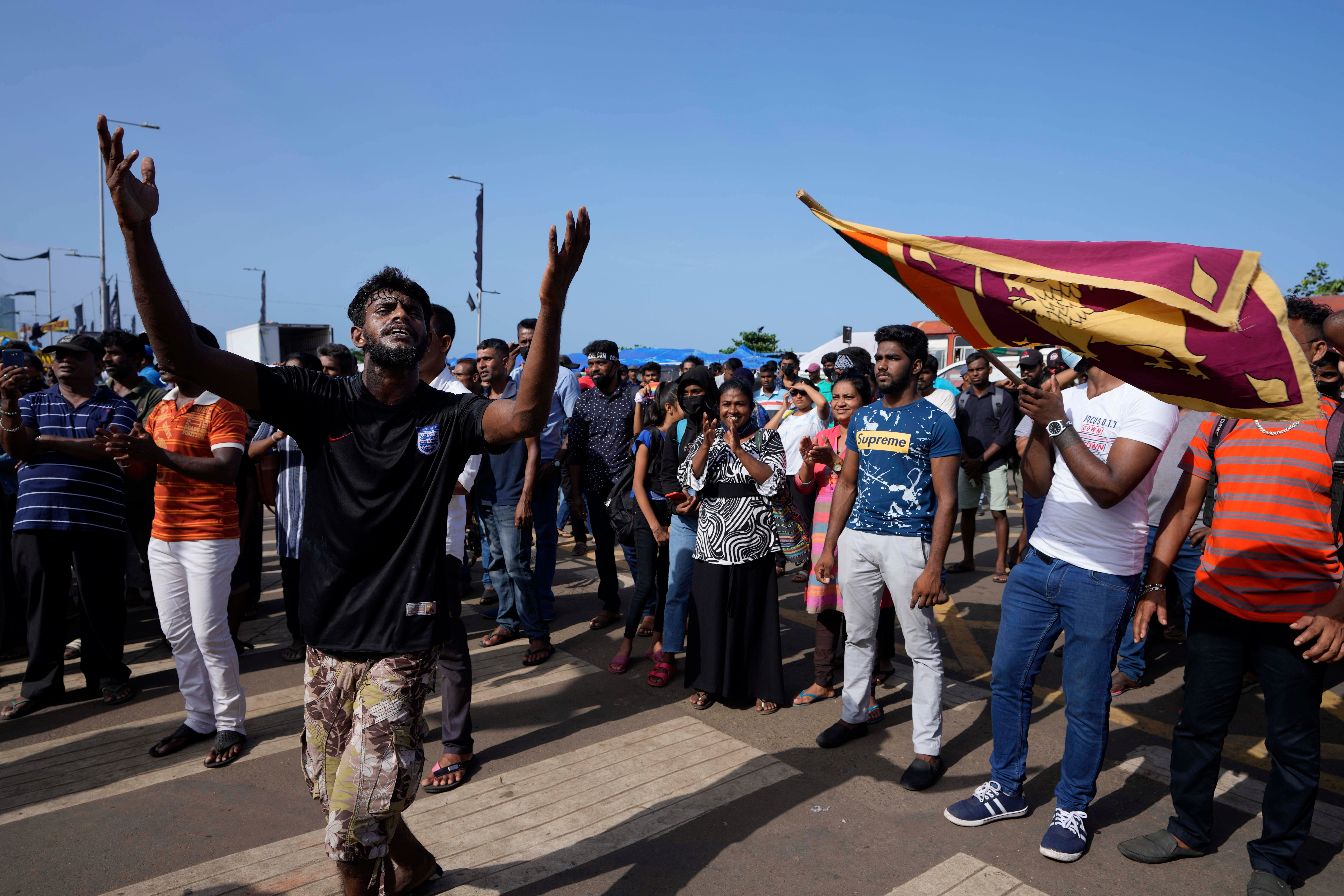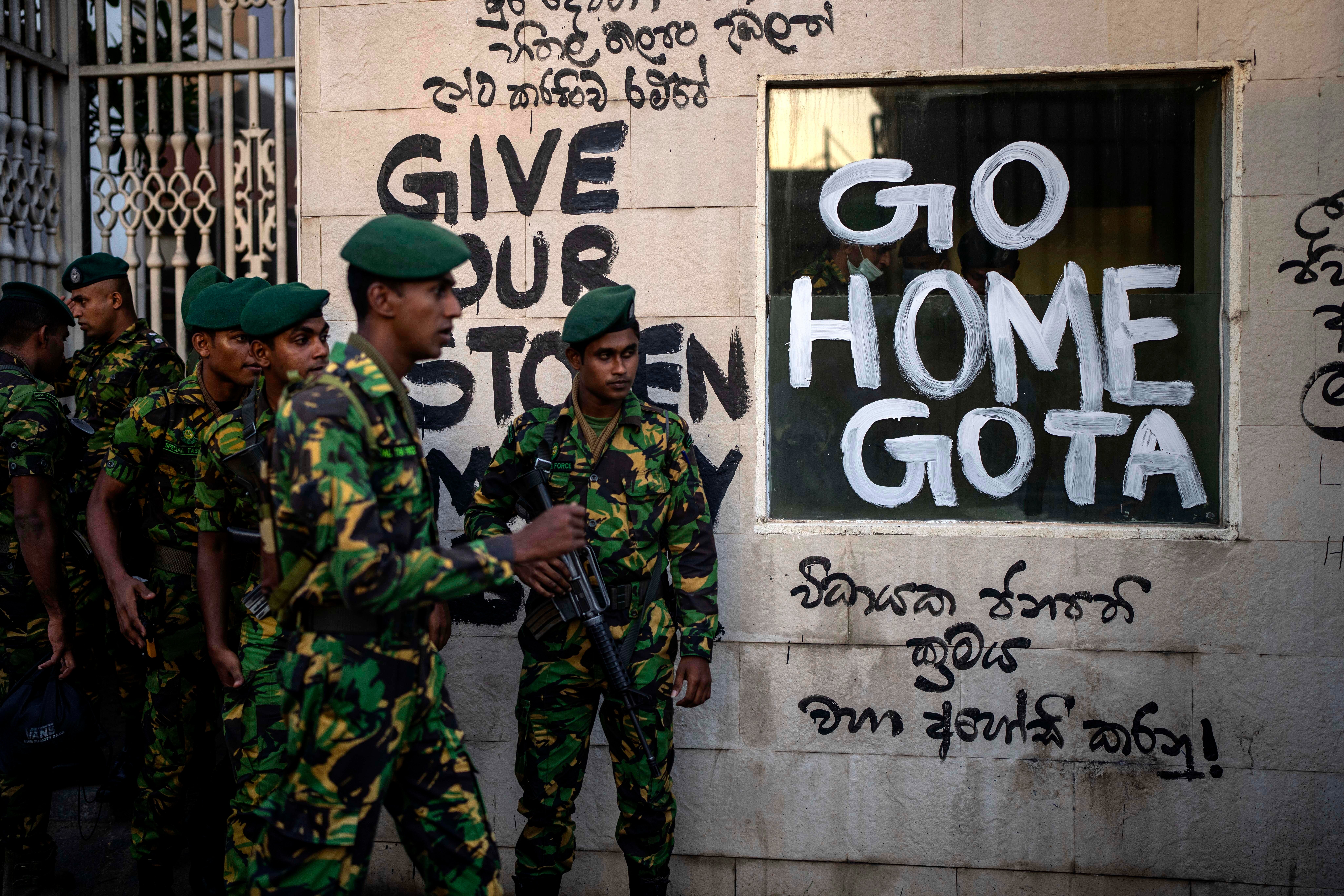Sri Lanka calls state of emergency as protesters storm PM’s office: What we know
The island nation is facing its worst political and economic crises in more than 70 years
Sri Lankan president Gotabaya Rajapaksa fled the country after the political crisis reached a dramatic head as tens of thousands of citizens stormed the presidential palace over the weekend, in protest against the country’s worst-ever economic emergency.
Mr Rajapaksa, 73, fled the cash-strapped nation after Tuesday midnight, just hours before he was to officially step down from the office. The president, his wife and two bodyguards left in a military plane bound for Male, the capital of the Maldives, the nation’s air force confirmed on Wednesday.
He will remain in the Maldives for a couple of days before flying out to the next destination, likely the United Arab Emirates (UAE), according to reports.
He is expected to officially step down from his office on Wednesday, the government said, months after people across the island nation took to the streets demanding his resignation.
An emergency was declared after protests intensified as news of the president fleeing spread. Security forces fire teargas shells and used water cannons to disperse a crowd when they tried to enter prime minister Ranil Wickremesinghe’s office, demanding his resignation as well.
Mr Wickremesinghe had offered to cede to his opponents’ demands that he step down, once all parties have agreed on a new government.

Earlier on Tuesday, Mr Rajapaksa and his brother, former finance minister Basil Rajapaksa, were stopped from flying out of the country by airport immigration staff on Tuesday. The president, who was believed to be holed up in a navy vessel on the Sri Lankan waters over the weekend, spent last Monday night at a military base overlooking capital Colombo’s main international airport after reportedly missing four flights.
The former finance minister was stopped from boarding the flight to Dubai as well after staff refused to serve him. “Given the unrest in Sri Lanka, immigration officials are under tremendous pressure to not allow top-level people to leave the country,” KAS Kanugala, chairman of the Sri Lanka Immigration and Emigration Officers Association, told Reuters.
Thousands of protesters in overcrowded buses poured onto the streets of Colombo on Saturday to occupy the president’s official residence.
Sri Lankan police had attempted to use tear gas and water cannon to disperse the crowds, with one defence official suggesting the measure – branded illegal by lawyers and opposition politicians – had only “encouraged more people to get on the streets in defiance”.
Extraordinary footage showed protesters breaking through police barricades and sweeping into the president’s colonial-era residence – from which he fled hours earlier.
Once inside, videos showed the crowd toting flags and banners through the corridors of the building, with some jubilant protesters feasting in the palace’s kitchen, taking selfies on beds and rifling through drawers, and even swimming in the president’s pool.
Hours later Mr Wickremesinghe’s private home in the capital was set on fire as the unrest concentrated nearby, at which point Sri Lanka’s parliamentary speaker announced that the president was also planning to resign on Wednesday.
Demonstrators have insisted they would continue to occupy the president’s residence till he officially resigns. They were also seen assaulting security guards, taking away cash from the presidential house and the next morning, cleaning up the mess created by the crowd.

Many citizens had reacted with disbelief in May when the president appointed Mr Wickremesinghe to be prime minister – a position the latter has now held six times without ever managing to serve a full term.
The president had hoped that the career politician would use his diplomacy and contacts to resuscitate Sri Lanka’s collapsed economy. But people's patience wore thin as shortages of fuel, medicine and cooking gas only increased and oil reserves ran dry.
What happens when both prime minister and president resign?
After both the prime minister and the president resign, speaker Mahinda Yapa Abeywardena will take over the leadership as acting president, according to the country’s constitution.
The political upheaval has prompted the opposition parties to muster a majority in the parliament to install a new government.
Opposition leader and chief of Samagi Jana Balawegaya party Sajith Premadasa has expressed his intention to run for the president’s office. Mr Premadasa told the BBC that his party and allies had agreed to put “my nomination for the position of presidency, if a vacancy occurs”.
The parliament will elect a new president on 20 July to lead the way for the formation of an all-party government. The newly-elected president will serve the remainder of Mr Rajapaksa’s term, which ends in 2024.
What has happened to Sri Lanka’s economy?
Sri Lanka is suffering its worst economic crisis since it gained independence from British rule in 1948.
While the nation’s finances took a hit as a result of the coronavirus pandemic and 2019 Easter bombings, many experts warn that the current economic woes are the result of policy mismanagement.
The country is suffering a severe foreign exchange shortage which has limited essential imports of fuel, food and medicine, with fuel shortages forcing school closures and rationing for essential services.
Sri Lanka’s foreign debts now total some £39bn, and days after Mr Wickremesinghe took office, the country defaulted on its foreign debts for the first time in history. The new prime minister warned that the country’s “broken” economy was “going to get worse before it gets better”, and the following month inflation hit 54.6 per cent.
It is currently in negotiations with the International Monetary Fund for a £3bn bailout package, having secured commitments from India and the World Bank for billions of dollars in support.

Were there any casualties on Saturday?
At least 39 people hospitalised during the protests on Saturday, including two police officers, hospital sources told Reuters.
Two of the injured are in critical condition while others sustained minor injuries, an anonymous official at the Colombo National Hospital told the Associated Press.
A local news channel said four journalists outside the prime minister’s private home were assaulted during the protests. The prime minister’s office expressed “grave regret” over the assault on reporters by security personnel.
To control the angry crowd at the presidential residence, police fired shots in the air but were unable to contain the overwhelming force of the crowd, eyewitnesses said.
In recent months, several Sri Lankans have been killed and hundreds wounded in anti-government demonstrations.
Where is the president now?
The president fled the country after Tuesday midnight, a day after he was stopped from flying out by the airport immigration staff. The Sri Lankan air force said in a statement that it provided an aircraft for the president and his wife to travel to the Maldives with the defence ministry’s approval.
It said all immigration and customs laws were followed.
Mr Rajapaksa had earlier fled the palace hours before it was swarmed by protesters on Saturday.
The president was taken to safety after demonstrators amassed outside the palace gates, and he is being protected by a military unit, a senior defence source told AFP.
His bid to flee to the cash-strapped country was foiled on Tuesday after Colombo airport immigration officers refused to cooperate and stamp his passport at the VIP lounge, to allow him to fly to the UAE, AFP reported.
The president had spent the night in a military base next to the airport after missing “four flights” the previous day, reports suggested. He was believed to be hiding in a navy vessel on the Lankan waters after protestors occupied his house.
“This shows what befalls a leader who uses his power to the extreme,” said lawmaker Ranjith Madduma Bandara, a senior official of the main opposition party in Parliament, United People’s Force.
Neighbouring India, which has extended a nearly $4bn credit line, has refuted reports that New Delhi facilitated the travel of Mr Rajapaksa.

What has the prime minister said about his plans to resign?
As the unrest intensified on Saturday, Mr Wickremesinghe held talks with several political party leaders to decide what steps to take.
“Wickremesinghe has told the party leaders that he is willing to resign as prime minister and make way for an all-party government to take over,” his office said in a statement.
But the prime minister said he would resign only when all parties agree on a new government, angering crowds near his home demanding he step down immediately.
“Today in this country we have a fuel crisis, a food shortage, we have the head of the World Food Programme coming here and we have several matters to discuss with the IMF. Therefore, if this government leaves there should be another government,” Mr Wickremesinghe said.
What does the economic crisis mean for residents?
A few years ago Sri Lanka’s economy was growing strongly enough to provide jobs and financial security for most. It's now in a state of collapse, dependent on aid from India and other countries as its leaders desperately try to negotiate a bailout with the International Monetary Fund.
Residents of Sri Lanka – especially the poorest – are paying the price, waiting for days for cooking fuel and petrol in lines that can extend more than a mile long.
At least 16 people have died so far waiting for fuel, including a 63-year-old man found inside his vehicle on the outskirts of Colombo.
The government has closed urban schools and some universities and is giving civil servants every Friday off for three months to conserve fuel and allow them time to grow their own fruit and vegetables.
Meanwhile, food price inflation is running at 57 per cent, according to government data, and 70 per cent of Sri Lankan households surveyed by Unicef last month reported cutting back on food consumption. Many families rely on government rice handouts and donations from charities and generous individuals.
More than 5.7 million people, including 2.3 million children, require humanitarian assistance, with Sri Lanka among the top 10 countries with the highest number of malnourished children, the UN agency has warned.
“It really is veering quickly into a humanitarian crisis,” said Scott Morris, a senior fellow at the Center for Global Development in Washington.
Additional reporting by agencies
Join our commenting forum
Join thought-provoking conversations, follow other Independent readers and see their replies
Comments
Bookmark popover
Removed from bookmarks